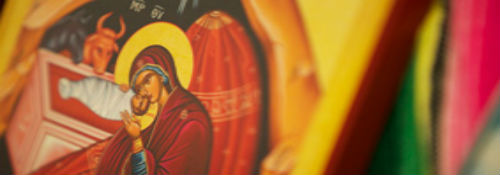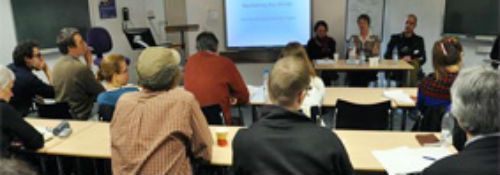Research
Bristol’s Department of Religion and Theology (RETH) promotes a distinctive research environment and culture, built on its strength and reputation in history and thought of global religious traditions, including Judaism, Christianity, Islam, and Buddhism. We have particular strengths in the histories, and the theological and philosophical traditions of these world religions.
RETH is the only Department in the UK recognised as having a characteristic and outstanding focus on Abrahamic religions and Buddhist Studies. The Department has produced exceptional research in both these areas, realising the potential for interdisciplinarity between the two clusters and across the Faculty of Arts.
With 8 full-time staff members, the Department has strategically developed a research agenda based on a rationale of depth. Our Department is highly recognised for its distinctive research environment and culture and was ranked first in the country in 2021 REF for the outstanding world-class quality of our research outputs.
We offer an impressive range of methodologies and approaches including: anthropology, history, philosophy, theology, manuscript studies, textual studies, linguistics, visual culture and phenomenology. Fortnightly Religion and Theology research seminars bring together staff, PGRs as well as members of the Arts Faculty and the wider University throughout the academic year. The department encourages staff and postdocs to develop and achieve their research goals through one-to-one meetings and mentoring.
Research areas
The Department’s specialisms are enhanced and supported by faculty centres and research clusters (e.g., , Centre for Material Texts, Centre for Health, Humanities and Science) which enable staff to pursue and develop their projects. Equally individual academics have established distinctive research areas that attract a number of research students as well as postdocs. The Department has expertise in the following areas.
Global Islam: History and politics of Global Islam and the wider Middle East, confessional relations in Islam, the impact of the Arab Spring on the Gulf States, global history of Sunni-Shii relations as well as cross-cultural relations between Christian, Islamicate and Jewish thought in medieval Europe.
Buddhist Material Culture: spanning from religious literary and visual narratives in ancient India, to material and visual culture of medieval Japan and material culture and ritual economy in contemporary Sri Lanka.
Medicine and Religion: the analysis of the intersection between medical and religious knowledge and practices in premodern East Asia as well as illness and healing in ancient Jewish medicine.
Medieval and Reformation Thought: the examination of medieval and reformation religious and intellectual culture, with a special emphasis on monasticism, medieval Aristotelianism, and the works of John Calvin and the Protestant Reformation.
Philosophy of Religion: philosophical approaches to religious experience, philosophical implications of psychological approaches to the study of religion, religious love/the heart, Platonism (especially, Christian Platonism), atheism/agnosticism.
Ritual Studies: the consideration of ritual in eastern and western traditions, with emphasis on Japanese and Sri Lankan religious practices as well as medieval and early modern Europe.
Religion and Textuality: the examination of scribal practices and religious agency in the transmission of scripture in the Hebrew Bible, the Hadith corpus, and Buddhist monastic codes.
Associated centres
Faculty of Arts Research Centres
- Centre for Health, Humanities and Science: Colleagues work on the intersection of religion and psychology, mental health and medicine.
- Centre for Material Texts: This Centre resonates with the departmental research expertise in the material culture of the Hebrew Bible and Buddhist Scripture
- : Departmental staff work close with this Centre in the exploration of the study of medieval religion and devotional practices and texts.
Faculty of Arts Research Clusters and Research Collaborations
Our numerous research clusters and collaborations provide opportunity for intellectual exchange across the Arts Faculty and Beyond.
University Research Institute
Elizabeth Blackwell Institute for Health Research
The Institute provides opportunities for funding and networking for our researchers who are working in the field of medical humanities.
Collaborations and activities
Centre for Medieval Studies and GW4 Alliance: As former co-Director of the Centre for Medieval Studies, Muessig submitted with Dr Ian Wei (History) two GW4 applications, an initiator grant (£2,542) and then an accelerator grant (£45,715) in 2014. These grants have enabled the research clusters of medievalists at the Universities of Bristol, Cardiff and Exeter to develop grant proposals in the fields of medieval literature, history and language.
Professor Gavin D’Costa and Dr Faydra L. Shapiro, Executive Director, Israel Center for Jewish-Christian Relations have received $50,000 grant form Philos, New York to organise an interfaith dialogue conference in Jerusalem in 2019.
Professors Gavin D'Costa and Professor John Pickard (Music) have collobrated on two poetry/music projects leading to two recordings of the outputs and performances, including the BBC Choral.

Our research feeds into School of Humanities research clusters, and forms part of the overall research strategies of the Faculty of Arts.
Top 5 for research intensity
We are top 5 in the UK for research into theology and religion based on our size.
You can browse our full published research output.
Looking to join us?
 Annual postgraduate conference
Annual postgraduate conference
The twenty fifth Joint Regional South West Theology & Religion Postgraduate Conference took place on 29th May this year. Watch this space for news about the twenty sixth postgraduate conference which will take place in spring of next year.
Interested in being a visiting researcher?
If you would like to be a visiting researcher at the University of Bristol, please see the School of Humanities' guidelines for visiting researchers, where you will also find an application form.